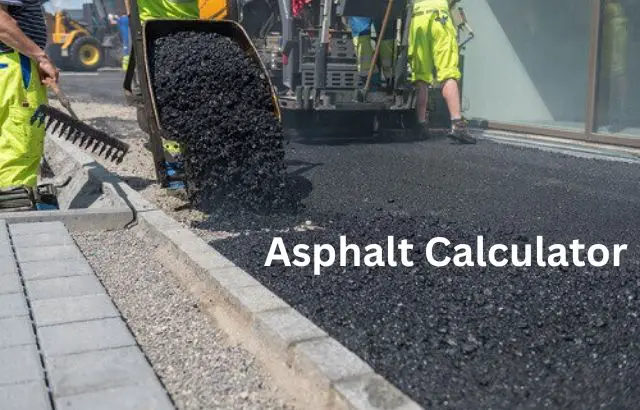Asphalt Calculator | Calculate the Volume & Quantity of Asphalt
Articles, products, and services offered on this site are for informational purposes only. We are part of the Amazon Services LLC Associates Program, an affiliate advertising program. Amazon.com is compensated for sales resulting from links on our website.
Please review our disclaimer before acting based on anything you read or see.
You encounter asphalt daily if you go anywhere in the United States, including on highways, roads, parking lots, garages, and more! Some factors contribute to asphalt’s widespread usage, but can you do the essential calculations? To aid you, we have made this post on Asphalt Calculator.
You must also know how much asphalt is required to cover an area completely if you attempt to pave a walkway with it. To purchase asphalt, which comes in tons, go to any market. Thus, it is vital to understand how to calculate asphalt tonnage to complete the task.
Because you won’t be able to calculate how much you need to purchase and how much it will cost if you don’t understand the calculating procedure. Follow us as we discuss the Asphalt Calculator in greater detail below.
Asphalt Calculator
What is an Asphalt?
Asphalt combines aggregates, binders, and fillers for building and maintaining roadways, parking lots, railroad lines, and porters. Along with sidewalks, bicycle lanes, and airport runways are also play and sports spaces.
Sand, gravel, broken rock, or slags may all be used as aggregates in asphalt mixes. Asphalt is now more sustainable since some waste and byproducts, such as building and waste, are utilized as aggregates.
A binder is employed to combine the aggregates into a cohesive slurry. Although bitumen is still the most used binder, some bio-based binders are now being developed to lessen the effect of roads on the ecosystem.
How to Calculate Asphalt
You can Calculate asphalt through the following Steps:
Step 1: Measure your route
The length, breadth, and depth of the space must all be measured at the beginning of the route.
You must get an exact reading for these area measures because your computation will be incorrect if you take the incorrect measurements.
To determine the size of the road, utilize measuring tapes. The measuring tapes provide an inch readout.
Step 2: Convert the measurements to feet
After taking the first reading of the dimensions in inches, you must now translate those figures into feet.
In a foot, there are 12 inches. So, to get the feet length, divide the values by 12. Do this to calculate the area’s length, breadth, and depth in feet.
Step 3: Multiply the measurements by cubic feet
The length, breadth, and depth must then be multiplied to get the real reading in cubic feet.
In this manner, you can accurately calculate the area’s volume and size.
The volume value indicates the area that you will cover with asphalt.
Step 4: Multiply the volume figure by the weight density of asphalt.
It would help if you now multiplied the volume value by the weight density of asphalt after determining the road’s volume.
Asphalt typically has a weighted density of 145 pounds per cubic foot. However, the amount could change according to the asphalt you’re using.
Therefore, contact the asphalt provider and get an exact reading of the quantity.
To get the amount of asphalt you need to cover your specified area, multiply the two quantities.
Step 5: Convert the quantity to tons.
To convert the quantity from pounds to tons, you must divide the figure from the previous step by the kilograms per cubic foot.
Per ton, there are 2,000 pounds. To convert your result to tons, you must divide it by 2,000 pounds.
You can find the quantity of asphalt to purchase by dividing the figure into tons. Using this simple equation, you may calculate the quantity of asphalt in tons.
This makes it simple for you to purchase asphalt for your project and makes it simple for you to pave the road with the asphalt you purchased.
Why You Need to Know the Asphalt
You should be familiar with asphalt for the following reasons:

Asphalt is 100 percent recyclable.
The most recycled commodity in America is asphalt. Experts recycle concrete, asphalt shingles, and 100% of the asphalt removed from construction sites. Utilizing recycled materials in the production of asphalt benefits the product as well as the environment. Compared to virgin asphalt mix, recycled asphalt mix is more durable, rut resistant, and better in terms of strength and durability.
Asphalt is enduring and strong.
An asphalt road or driveway constructed by a qualified asphalt contractor lasts 15 to 20 years. The anticipated lifetime will increase if you provide your surface routine preventive care.
Asphalt Helps to Reduce Noise
The most “silent” kind of pavement is asphalt. Asphalt absorbs road noise because of its open-graded areas, fine-graded substrates, and the materials utilized.
Asphalt is Economical
Generally speaking, installing asphalt is substantially less expensive than installing concrete. Crude oil is one of the primary ingredients in every asphalt mixture. The price of asphalt may fluctuate as a result of these changes in crude oil prices.
Asphalt projects are suitable to complete
The ingredients required to make asphalt are readily available and may be converted into asphalt relatively fast.
Things to Consider Before Calculating Asphalt
Before calculating asphalt, there are a few factors to keep in mind:
Waterproof characteristics
Asphalt is a lightweight, water-repellent substance that does not disintegrate in liquid. It is waterproof because it has excellent plasticity, adhesion, and bonding forces with mineral materials.
Viscosity
The property of viscosity describes how the components of asphalt restrict its flow. The viscosity of asphalt also reflects its density and hardness. Various states of asphalt have varying viscosity indices while at room temperature. Immersion is a term used to describe the thickness of semisolid or pure asphalt at room temperature. The viscosity of fluid asphalt is measured at room temperature using the viscosity degree.
Flexibility
The asphalt deforms but is not shattered when an outside force is applied. Additionally, the asphalt maintains its distorted shape after the external force has been released, symbolized by ductility.
Thermostat Sensitivity
Temperature sensitivity is the ability of asphalt to alter viscosity and flexibility in response to temperature changes. A non-crystal polymer substance is an asphalt. On the contrary hand, asphalt has a variable melting point and adapts to variations in temperature. When the temperature fluctuates at the same pace, but viscosity and plasticity don’t vary much, asphalt is less sensitive to temperature variations. Additionally, it is high when viscosity and plasticity vary significantly, yet temperature fluctuates simultaneously.
Asphalt basics & applications
Asphalt is a dark, gooey, and extremely dense petroleum. It is classified as a pitch and may be found in natural sources, although it is more often the end product of refining. Since asphalt is readily recyclable, it saves money and improves the environment.
Although asphalt is mostly used for paving rows, it is a substance that is employed extensively due to its adaptability. As a result, it is also utilized for other things, including building construction, agriculture, industrial usage, and transportation and leisure. Consequently, the following list of uses and applications for asphalt is provided:
Tunnel asphalt pavement
Asphalt is used to pave most roads because it is durable and performs well, especially in areas with large traffic volumes. It provides enduring performance and durability in various environmental and temperature settings. Asphalt is primarily utilized in industrial regions for certain specialized uses, such as constructing airports. In addition, it is often used to construct tunnels and serve as the foundation for structures and railroad lines.
Bridge deck asphalt
In most European nations, asphalt pavements are placed on concrete bridges. One of the major uses for asphalt as a surface material is to shield steel and concrete buildings from de-icing salts and water.
Asphalt usage on airfields
Asphalt is used to pave most roads because of its great durability and performance in most heavy traffic environments. High-standing and stopping roads designed for light and large cars are also built using asphalt. They are well suited for building and paving access roads, boundary roads, and airfield car parking zones.
Asphalt is mostly used in the construction of airport pavements. Runways, taxiways, aprons, and parking spaces make up airports. For various sorts of standards, several surface courses are needed.
Types of Asphalt
A few varieties of asphalt are:

Hot Mix Asphalt
Typically, hot asphalt mixtures are created between 150 and 180 0C. Several asphalt mixes might be utilized depending on the application’s purpose and location. The two main uses of it are paving and repairing. When asphalts are hot, it is simpler to work with them. It is a long-term fix for all paving and repairing issues, but it must be applied immediately after purchase.
MC cold mix
It is used as a temporary patch and is temporarily utilized as asphalt. It has a delayed cure since it is utilized in a chilly form. Thus its warmth is likewise frigid. It thus fits well in locations with very little to no traffic.
UPM
It is also chilly asphalt, but unlike the MC concrete matrix, it is utilized as a long-term fix for any issues with concrete or asphalt mix. It is built to be resilient in all weather and can handle any traffic volume. As a result, it is used to repair dry and moist holes. This makes any condition’s correction quite simple. When the asphalt is compacted, it is suitable for walking on.
Warm Blend
Normally, this is combined and sent when it’s warmer. As a result, it does not cool down as quickly as the hot mix. As a result of the emulsion employed in it, it is also simpler to pour and distribute.
Scale back asphalt
Asphalt cement and petroleum solvent are reduced asphalt ingredients. It has a lower viscosity and thickness, so it is chosen over other asphalts. Due to the presence of various volatile ingredients, it is prohibited in several places.
This can also be seen in the infographics below.
Importance of Asphalt Calculation
For the following reasons, it is crucial to determine an aggregate’s affinity for asphalt before using it in construction.
- Aggregates and asphalt will react differently if their affinity is inadequate. Additionally, it won’t fulfill the function of asphalt pavement.
- Rapid traffic movement and weather conditions will cause asphalt to peel away from aggregate owing to inadequate affinity. Serious anguish will result from this.
- The pavement’s resilience will deteriorate.
- The asphalt mix will lose its capacity to be worked while being laid. Additionally, it won’t be effectively compressed during compaction.
How much does an asphalt driveway cost?
A ton of asphalt costs between $80 and $200, depending on its weight. Your location, the kind of asphalt you want to buy, and the oil price will all affect the cost. As was already said, blacktop is less expensive than standard asphalt concrete since it contains less bitumen. All you have to do to determine how much asphalt will cost for your project is multiply the amount needed by the asphalt’s price per weight.
Frequently Asked Questions
How many tones of tarmac are in an m3?
An m3 contains more than 2.5 tons of tarmac.
How much will a ton of asphalt cover?
Between 14 and 18 square meters may be covered by a ton of asphalt for layers with an average depth of 25mm (m2).
How do I calculate my road work?
The cost of building a road is determined by determining how many cubic meters of rock and common material will need to be transported. The number of cubic meters per kilometer that must be dug divided by the number of cubic meters per hour that can be excavated and deposited is the production rate for road construction.
How many yards are 3 tons of asphalt?
1 cubic yard of asphalt usually produces 1.95 short tons. It will provide roughly 3.9 short tons for 2 cubic yards. Additionally, it will produce roughly 5.85 short tons for 3 cubic yards.
How many square feet will 1 ton of asphalt cover 1.5 inches thick?
30 to 80 square feet may be covered by one ton of asphalt. 7.5 to 18 tons of asphalt, based on thickness, are required for a 2-car driveway.
How many tons are 2 yards of asphalt?
Asphalt produces 1.95 short tons per cubic yard and roughly 3.9 short tons per cubic yard for 2 cubic yards.
Is asphalt cheaper than concrete?
An asphalt pavement generally costs $2 to $4 less per square foot than a concrete driveway. Asphalt prices often change along with those for crude oil. A conventional concrete driveway installation costs around $4.00 and $6.00 per square foot.
How many tons of asphalt is in a dump truck?
Super Dumps can handle payloads weighing between 19 and 26 tons if the weights are evenly distributed across the axles. According to federal bridge regulations, a standard tandem dump truck can only carry a cargo of around 13 tons.
Does crushed asphalt make a good driveway?
Yes. It is not only very cost-effective but also quite durable. Crushed asphalt may thus be your best option, yet if you’re a landowner on a limited budget seeking a top-notch driveway material.
Expert Opinion
Different varieties of bitumen that are found naturally are called asphalts. Another byproduct of the oil and gas industry is asphalt. Both substances are dark in color and very soluble in carbon desulphated. They may be anything from a solid to a very viscous fluid in terms of consistency. Asphalts may or may not include mineral particles.
Numerous types of asphalt may be discovered as viscous impregnations in sandstones, siltstones, and limestones. As highlighted above, they can be used effectively if you perform the right calculations.



Comments are closed.